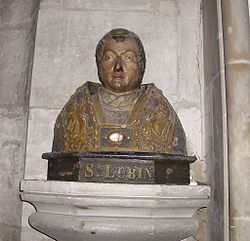Saint Leobinus | |
|---|---|
 Bust of Saint Leobinus. Church of Notre Dame de Louviers. | |
| Died | 556 AD |
| Venerated in | Roman Catholic Church, Orthodox Church |
| Feast | 14 March (formerly 15 September) |
| Attributes | depicted on his death-bed receiving the last rites from his successor Saint Caletric |
Saint Leobinus (French : Lubin) (died 14 March 557) [1] [2] was a hermit, abbot, and bishop. Born in a peasant family, he became a hermit and a monk of Micy Abbey before being ordained a priest. He was then elected abbot of Brou and in 544, became Bishop of Chartres, succeeding Etherius with the consent of king Childebert I.